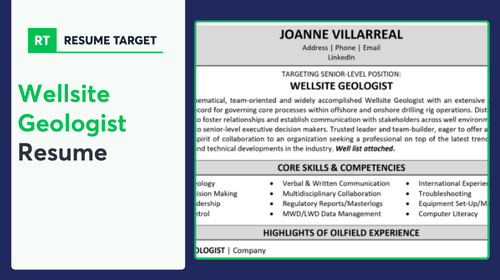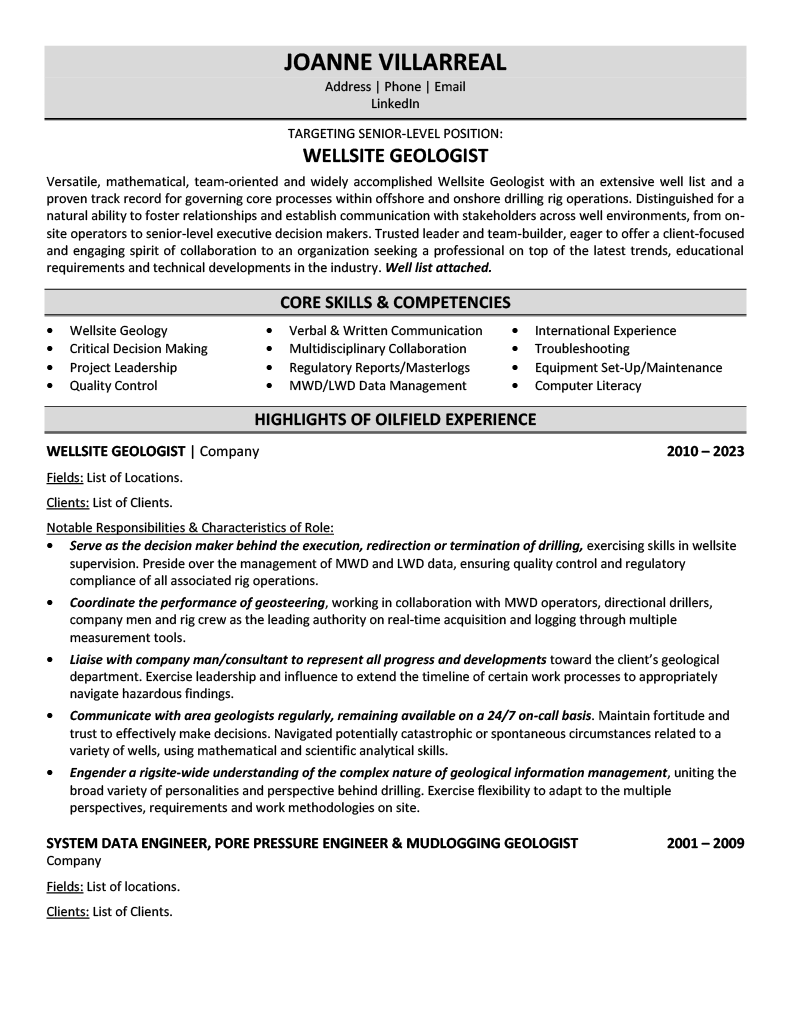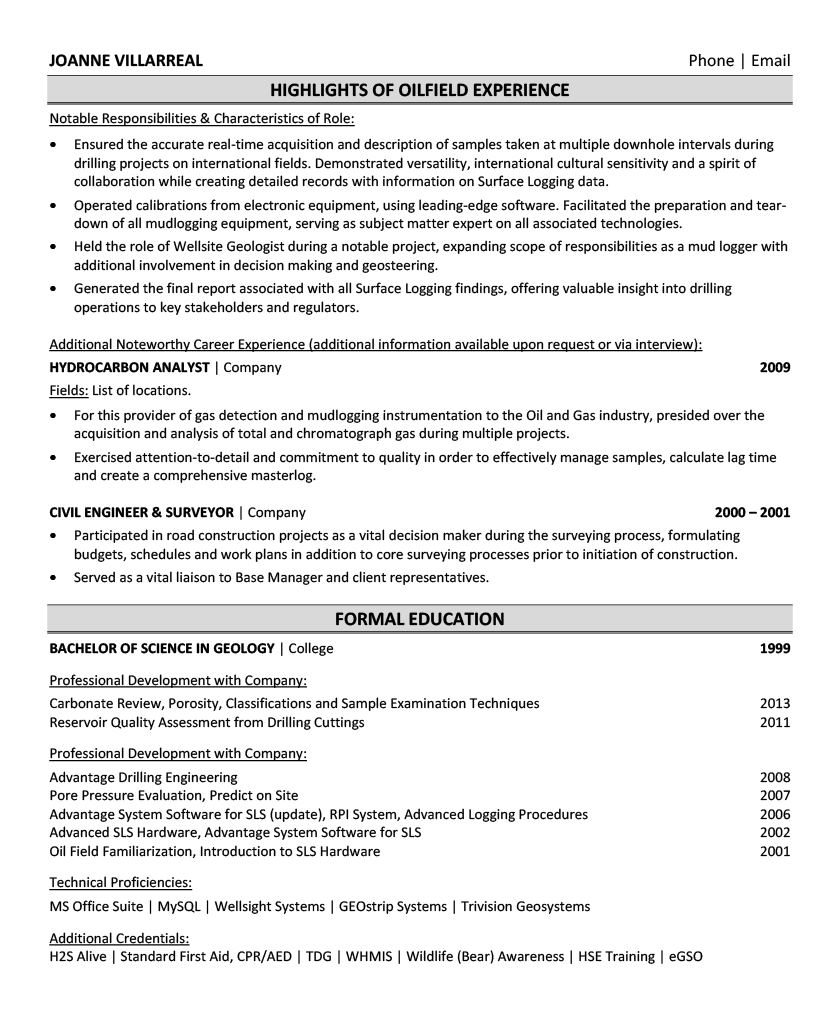

Translating complex geological data into a compelling career story stumps even the most experienced wellsite geologists. Your technical expertise is solid, but your resume might be buried under layers of industry jargon.
Are you struggling to showcase both your field experience and technical knowledge in a way recruiters understand? A well-crafted resume can bridge the gap between your hands-on expertise and what hiring managers need to see.
Resume Target specializes in helping wellsite geologists transform their technical achievements into clear value propositions. This guide will show you exactly how to create a resume that gets you noticed by top energy companies and lands more interviews.


As the eyes and ears of drilling operations, Wellsite Geologists make critical real-time decisions that can mean the difference between striking oil and coming up dry, with some positions offering salaries reaching up to $150,000 annually due to their crucial role in resource discovery.
Working directly at drilling sites, you'll analyze rock samples and drilling data to guide operations, using specialized equipment and software to interpret geological formations while collaborating with drilling teams to optimize well placement and ensure safe extraction procedures.
Whether you're just starting with a geology degree or looking to advance your career, the path to becoming a Wellsite Geologist offers diverse opportunities for growth, from entry-level mudlogging positions to senior consulting roles where you'll shape major drilling projects.
Let's talk about what makes a career as a Wellsite Geologist so financially rewarding! Your expertise in analyzing geological data and monitoring drilling operations is highly valued, especially in the agriculture and energy sectors. And guess what? The compensation packages are quite impressive, with opportunities for both strong base salaries and additional performance bonuses.
Figures from: Glassdoor
Starting as a mudlogger or data engineer, you can advance to become a wellsite geologist with the right experience and qualifications. Your path to success includes gaining field expertise and pursuing chartered geologist status.
Beyond basic geological knowledge, your career advancement depends on developing a comprehensive skill set that combines technical expertise with strong leadership abilities.
- Advanced geological analysis and interpretation - Well logging and formation evaluation - Project management and risk assessment - Cross-cultural communication and team leadershipBreaking into wellsite geology typically starts with earning a geology degree and gaining hands-on experience through internships or entry-level positions at oil and gas exploration companies.
To advance in this field, you'll need to develop key competencies including strong analytical and critical thinking skills that will help you evaluate complex geological data and make informed decisions on drilling sites.
Requirements from American Institute of Professional Geologists
From California's diverse geology to Pennsylvania's energy sector, wellsite geologists find opportunities across tech services and energy.
Figures from U.S. Bureau of Labor Statistics
Struggling to translate your complex field experience, geological analyses, and technical expertise into a compelling wellsite geologist resume that catches a hiring manager's attention? This comprehensive, section-by-section guide will show you exactly how to showcase your geological expertise, field accomplishments, and technical skills in a format that resonates with employers.
As a Wellsite Geologist, translating your complex field expertise and technical knowledge into a compelling resume summary can feel as challenging as interpreting difficult formation data.
While you excel at analyzing lithology, monitoring drilling parameters, and making critical real-time decisions at the wellsite, capturing these specialized skills in a way that immediately resonates with hiring managers requires a strategic approach that highlights both your technical capabilities and business impact.
How would you characterize your expertise across different drilling environments and geological formations you've worked with throughout your career?
Reason: This helps establish your breadth of experience and technical versatility, which are crucial differentiators for Wellsite Geologists. It sets the foundation for showcasing your adaptability across various project environments.
What would you say is your primary value proposition in terms of bridging geological expertise with operational drilling decisions?
Reason: This question helps articulate your ability to translate complex geological data into actionable drilling recommendations, which is a key selling point for any Wellsite Geologist's summary.
How would you describe your approach to integrating safety protocols with geological monitoring and well control practices?
Reason: This highlights your commitment to both technical excellence and safety standards, which are paramount concerns for employers in the oil and gas industry when hiring Wellsite Geologists.
As a Wellsite Geologist, your skills section needs to demonstrate both your technical expertise in formation evaluation and sample analysis, as well as your ability to make quick decisions during critical drilling operations.
From specialized software like Petrel and GeoGraphix to hands-on skills like mudlogging and lithology interpretation, your resume should showcase both the high-level analytical abilities and day-to-day operational competencies that make you an effective wellsite professional.
Showcase your geological expertise by organizing your experience into three powerful sections: a concise role overview that sets the stage, quantifiable achievements that highlight your impact on drilling operations and formation analysis, and core responsibilities that demonstrate your technical proficiency in wellsite operations.
Many Wellsite Geologists struggle to translate their technical field observations and real-time drilling decisions into compelling resume achievements that executives understand. Transform your daily geological interpretations and mudlogging data into powerful metrics that showcase cost savings, improved drilling efficiency, and successful well completion rates.
A strong responsibilities section demonstrates how Wellsite Geologists contribute to successful drilling operations and resource discovery. Your duties should clearly show both technical expertise and your ability to communicate critical geological data to drilling teams and company stakeholders.
Your education and certifications are crucial proof points that show you can handle the technical demands of wellsite geology. Start with your highest geology degree, then list relevant certifications that demonstrate your expertise in formation evaluation, mud logging, and well control procedures.
Now that you've built a strong foundation using Resume Target's proven resume writing guidelines, you're ready to transform your resume into a powerful tool for landing wellsite geologist positions.
While many geologists make the mistake of using the same resume for every application, successful candidates know that personalizing their resume for each wellsite position is just as crucial as customizing their cover letter.
By carefully aligning your experience and technical skills with each job description's specific requirements, you'll not only sail through ATS screenings but also immediately show hiring managers you're the ideal candidate who truly understands their drilling operation needs.
Ready to turn your resume into your secret weapon? Let's make every word count and show employers why you're the wellsite geologist they've been searching for!
Don't let a lack of field experience hold you back from launching your career as a Wellsite Geologist!
Your geology degree, lab work, and field camp experience can create a compelling story that showcases your readiness for the role.
Focus on highlighting your geological knowledge, analytical capabilities, and field training experiences to create a standout resume.
For detailed guidance on structuring your qualifications, check out the Student Resume Writing Guide to ensure you're presenting your skills effectively.
Your geology degree and fieldwork experience are powerful assets that deserve to shine in your resume summary, even without extensive professional experience.
Focus on showcasing your practical geological skills, research projects, and any relevant internships or field studies that demonstrate your readiness for wellsite responsibilities.
"Detail-oriented and field-experienced Wellsite Geologist with comprehensive academic training and hands-on experience through geological mapping projects and field studies. Proficient in core sampling, well log interpretation, and geological software including Petrel and GeoGraphix. Demonstrated strong analytical abilities through undergraduate research projects and summer internship at XYZ Mining. Seeking to leverage strong geological knowledge and enthusiasm for field operations to contribute effectively as a Wellsite Geologist."
Now's your chance to showcase the robust geological education that forms the foundation of your wellsite expertise - from core analysis techniques to advanced stratigraphy knowledge!
Transform your academic background into compelling content by highlighting relevant coursework like "Sedimentary Basin Analysis"or "Petroleum Systems,"along with any field mapping projects or well logging practicums that demonstrate your hands-on capabilities.
The coursework common for Wellsite Geologist education includes a degree in geology or a related earth science. Specific courses may include Mineralogy, Chemistry of the Earth, Geophysics, Paleontology, field geology, physical geology, petrology/petrography, structural geology, and stratigraphy. Training programs also cover geosteering, reservoir characterization, mudlogging, and subsurface geology. Additional training in wellsite and offshore safety management, risk assessment, and wellsite operations is also common.Relevant Coursework: Mineralogy | Chemistry of the Earth | Geophysics | Paleontology | Field Geology | Structural Geology
Key Projects:
Subsurface Mapping Analysis Project: Conducted comprehensive geological mapping and stratigraphic correlation of a complex formation system to determine potential hydrocarbon reservoirs and structural traps.
Field Geology Assessment Initiative: Led a team of four geology students in conducting detailed field mapping and sample collection at an active drilling site to assess geological formations and structural features.
Leverage your academic background, field experience, and technical training by showcasing the specialized skills you've developed through geology coursework, laboratory analysis, and field studies to create a compelling skills section that catches employers' attention.
As an entry-level Wellsite Geologist, your combination of technical knowledge and analytical capabilities positions you well for a growing field where skilled professionals are increasingly in demand across energy and resource exploration sectors.
Let's face it - translating those long hours on the rig, complex formation analyses, and critical decision-making moments into compelling resume content can feel like trying to describe a core sample without actually showing it.
At Resume Target, we specialize in crafting resumes for wellsite geologists that speak both the technical and business languages of the geology industry.
Our expert writers have helped countless geologists showcase their expertise in everything from mud logging to formation evaluation, consistently landing interviews with top energy companies.
With exploration budgets opening up and new projects getting greenlit across multiple basins, now is the perfect time to transform your experience into a powerful career story - let's start with a free consultation today.
Impress any hiring manager with our Geology resume writing service. We work with all career levels and types of Geology professionals.
Learn More → Geology Resume Writing Services